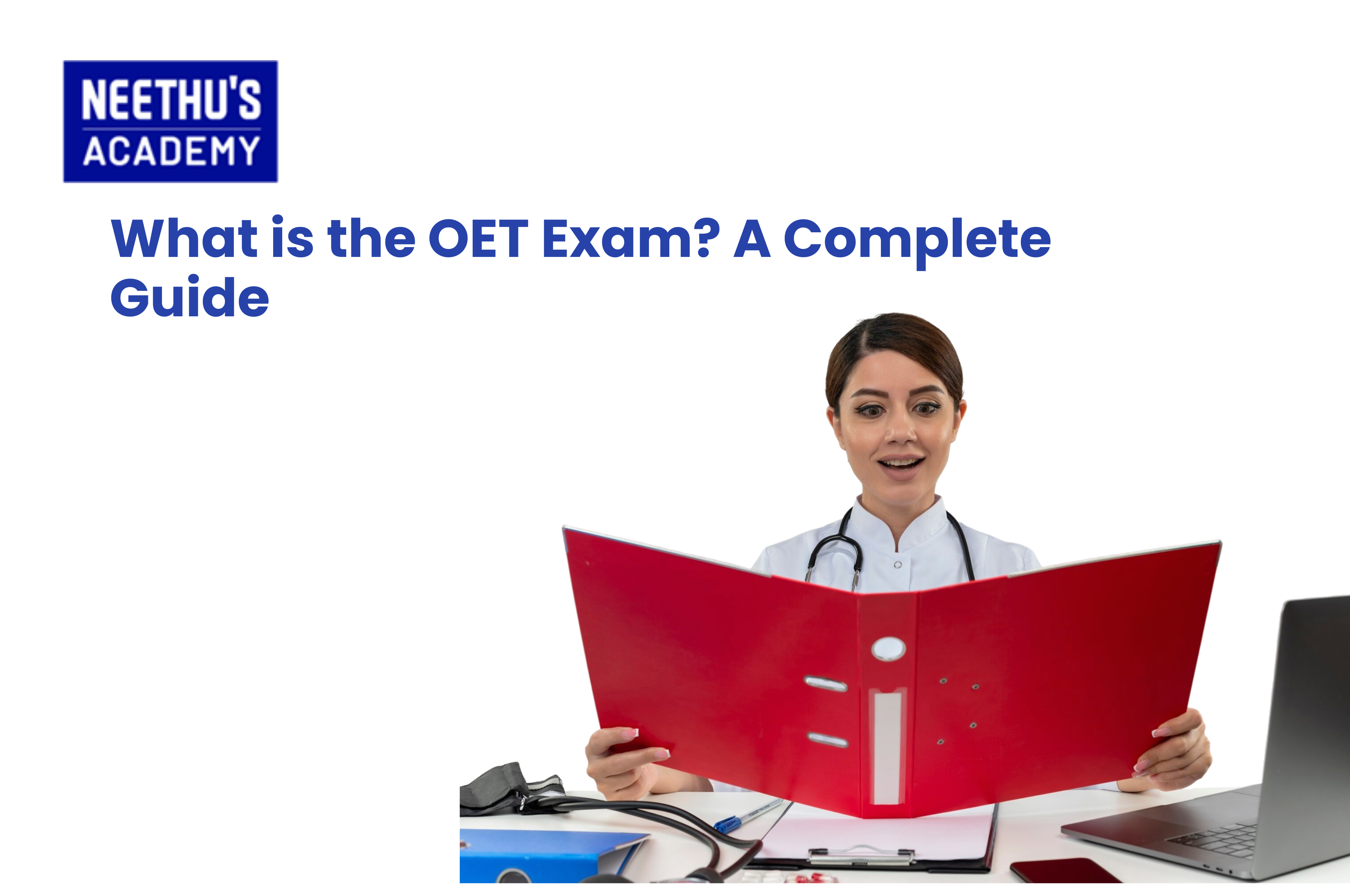The Occupational English Test is an entry pass for health care providers, including pharmacists, showing proof of proficiency in using English in…

What is the OET Exam? A Complete Guide
For medical professionals looking to establish a career overseas, demonstrating English language competency is usually a prerequisite. While tests such as TOEFL and IELTS are widely used, the OET exam is a specialized test designed for the medical profession.
The Occupational English Test (OET) measures the English communication capacity of healthcare professionals in actual clinical environments. This makes it extremely useful for nurses, physicians, pharmacists, and others who wish to work or study in the English-speaking world. In contrast to common English tests, OET assesses your capability to manage medical discussions, patient interviews, and professional writing tasks.
What is the OET Exam?
The OET, which stands for Occupational English Test, is a global language test specifically designed for healthcare professionals. Its role is to guarantee that the applicants can communicate well with fellow employees as well as patients in the medical setting.
The OET test is carried out by Cambridge Boxhill Language Assessment (CBLA), a partnership between Cambridge Assessment English and Box Hill Institute. The OET has acquired international acceptability and is utilized by health boards and employers in various countries.
Where is OET Accepted
The OET test is accepted across many countries of the world like the United Kingdom, Australia, New Zealand, Ireland, Singapore, and the United Arab Emirates. The healthcare regulatory agencies, hospitals, and institutions of these countries utilize OET in the course of their licensing or admission process.
OET Exam Structure
The OET test consists of four parts, each to assess your communication in various situations:
- Listening – This part takes 45 minutes. You will hear consultations, health talks, and lectures, and then respond with questions based on what you hear. It tests how well you can comprehend spoken English in a clinical environment.
- Reading – The reading test lasts 60 minutes and consists of three sections. You will read healthcare texts from brief notes to longer passages, and respond to questions. In this section, your ability to analyze and comprehend medical information is tested.
- Writing – The writing section lasts for 45 minutes. Candidates typically get to write a letter, e.g., referral, transfer, or discharge letter. The task is always related to your healthcare career, so that you get to practice actual work-like writing tasks you may perform on the job.
- Speaking – This is approximately 20 minutes long and consists of role-play exercises. You are a healthcare worker, and the examiner is either a patient or a relative of a patient. This assesses your skills in dealing with patients and communicating medical problems in plain, professional English.
Scoring System
OET is scored in grades ranging from A to E. Grade A corresponds to a very high level of proficiency, and Grade B corresponds to a strong level of performance and is generally the minimum acceptable for registration in most nations. Grades C+, C, D, and E correspond to lower levels of ability. In most licensing boards, all sections Grade B constitutes a pass.
Eligibility for OET
The OET test is not available to all. It is only meant for medical professionals who aim to work or study in an English-speaking setting. The candidates eligible are doctors, nurses, dentists, pharmacists, physiotherapists, veterinarians, radiographers, optometrists, podiatrists, and occupational therapists.
Education-wise, candidates are typically expected to have finished or nearly finished their healthcare qualification. Final-year students and fresh graduates may also sit for the exam if they are about to register with professional healthcare organizations.
Advantages of OET
Taking the OET exam has numerous benefits for healthcare professionals:
- International Acceptance – OET is recognized in several nations around the world in Europe, the Middle East, Asia, and Oceania.
- Medical-Themed Content – Because all tasks are modelled on medical situations, the test comes across as more realistic and applicable than conventional English tests.
- Self-Assurance in Actual Situations – Practicing actual clinical encounters, OET enhances your self-assurance when interacting with patients and colleagues in English.
- More Convenient for Professionals – Health professionals tend to find OET less intimidating than IELTS since it is based on common medical jargon.
- Cues Career Opportunities – A favorable OET score tends to be the decisive factor in getting international work prospects, higher studies, or professional registration.
- Employers’ Choice – Most hospitals and healthcare organizations prefer OET since it facilitates safe communication in clinical practice.
OET vs IELTS – A Brief Comparison
Though both OET and IELTS are tests of English language proficiency, there are certain fundamental differences. OET is specifically intended for healthcare professionals, while IELTS is intended for a broader range of people, such as students, immigrants, and professionals of all professions.
The OET test emphasizes medical communication. For instance, you may write a referral letter or participate in a consultation role-play. IELTS writing tasks, on the other hand, may include essays or general letters that are not healthcare-focused.
As far as acceptance is concerned, IELTS is accepted for university admissions, immigration, and professional licensing in a wide range of industries. OET, however, is primarily accepted by healthcare boards, medical-related course universities, and hospitals.
Preparing for OET
Preparation for OET needs to be consistent and focused. Following are some good preparation tips:
- Get Familiar with the Format – Begin by knowing the format of the test and the requirements of individual sections.
- Practice with Official Materials – Practice using official OET study materials to have a clear sense of the test.
- Join Coaching Programs – Most OET coaching centers provide specialized training for every sub-test, which can enhance your performance.
- Practice Speaking Role-Plays – As it is an important segment of the exam, practice patient interactions with a mentor or partner.
- Improve Your Medical Vocabulary – Enhance your skill to describe medical conditions and procedures in plain English.
- Try Mock Tests – Practice tests of the entire length make you deal with time and minimize exam day tension.
- Ask for Feedback – Have your writing and speaking checked by experts to know your weak spots.
Following these tips, you can maximize your chances of getting Grade B or above.
Conclusion
Preparation for OET needs to be consistent and focused. Following are some good preparation tips:
- Get Familiar with the Format – Begin by knowing the format of the test and the requirements of individual sections.
- Practice with Official Materials – Practice using official OET study materials to have a clear sense of the test.
- Join Coaching Programs – Most OET coaching centers provide specialized training for every sub-test, which can enhance your performance.
- Practice Speaking Role-Plays – As it is an important segment of the exam, practice patient interactions with a mentor or partner.
- Improve Your Medical Vocabulary – Enhance your skill to describe medical conditions and procedures in plain English.
- Try Mock Tests – Practice tests of the entire length make you deal with time and minimize exam day tension.
- Ask for Feedback – Have your writing and speaking checked by experts to know your weak spots.
Following these tips, you can maximize your chances of getting Grade B or above.
Frequently Asked Questions
It is Occupational English Test.
Healthcare professionals like nurses, doctors, pharmacists, dentists, and others.
There is a minimum of Grade B, which is 350 points in each sub-test, required by most countries.
OET is specialist health-focused, whereas IELTS is a general test for academic, professional, and immigration purposes.
Related Blogs
- All Posts
- OET
- Back
- OET FOR PHYSIOTHERAPIST
- OET FOR PHARMACIST
- OET FOR DOCTORS
Among the several components of the OET, the Speaking sub-test is crucial and evaluates your proficiency not only in language but also…
Preparing for the Occupational English Test (OET) can be a game-changer for nurses aiming to advance their careers globally. At Neethu’s Academy,…
Course Enquiry
Latest Posts
- All Posts
- canada
- CBT
- DELF
- DHA
- French
- GENERAL
- German
- Haad
- IELTS
- IQN NEW ZEALAND
- MOH
- NCLEX-RN
- NHRA
- OET
- OSCE
- Pearson Vue
- PROMETRIC
- PTE
- TOEFL
- Back
- NCLEX - NGN
- Back
- OET FOR PHYSIOTHERAPIST
- OET FOR PHARMACIST
- OET FOR DOCTORS



